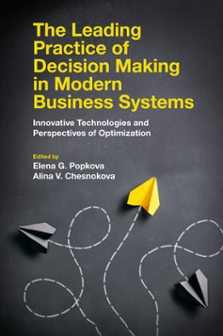
Index
The Leading Practice of Decision Making in Modern Business Systems
ISBN: 978-1-83867-476-2, eISBN: 978-1-83867-475-5
Publication date: 2 December 2019
Citation
(2019), "Index", Popkova, E.G. and Chesnokova, A.V. (Ed.) The Leading Practice of Decision Making in Modern Business Systems, Emerald Publishing Limited, Leeds, pp. 179-185. https://doi.org/10.1108/978-1-83867-475-520191020
Publisher
:Emerald Publishing Limited
Copyright © 2020 Emerald Publishing Limited
INDEX
- Prelims
- Introduction
- Part I Generalization of the Existing Experience of Decision Making in Modern Business Systems
- Chapter 1 The Russian Model of Decision Making in Modern Business Systems
- Chapter 2 Current Tendencies of Transformation of the Russian Practice of Decision Making in Business Systems
- Chapter 3 Problems of Decision Making in Business Systems by the Example of Modern Russia’s Industry
- Chapter 4 Barriers on the Path of Making of Optimal Decisions in Business Systems by the Example of Modern Russia
- Chapter 5 Successful Global Experience of Decision Making in Modern Business Systems
- Part II Technologies of Support for Decision Making in Modern Business Systems
- Chapter 6 The Role and Functions of Mediator in the Process of Decision Making in Modern Business Systems
- Chapter 7 Innovative Managerial Technologies of Decision Making in the Sphere of Digital Medicine in Modern Business Systems
- Chapter 8 Innovative Management Technologies of Decision Making in Modern Business Systems
- Chapter 9 Analysis and Support of Decision Making with the Use of Latest Information and Communication Technologies for Development of Social and Economic Area with Regard to Capabilities of Different Categories of Population
- Chapter 10 Intellectual Support for Decisions in Modern Business Systems
- Part III Recommendations for Improving the Process of Decision Making in Modern Business Systems
- Chapter 11 Prospective Directions of Improving the Process of Decision Making in Business Systems by the Example of Modern Russia
- Chapter 12 The Mechanism of Highly Effective Decision Making in Modern Business Systems
- Chapter 13 Strategy of Highly Efficient Decision Making in Modern Business Systems
- Chapter 14 The Optimization Model of Decision Making in Modern Business Systems
- Chapter 15 Algorithm of Implementation of the Optimization Model of Decision Making in Modern Business Systems
- Chapter 16 Development of Tools to Support Decision Making in Evaluating the Performance of State Energy Efficiency Policy (the Case of Russian Regions)
- Chapter 17 Structuring the Information Base on Production Losses in the Conditions of Effective Production Management
- Conclusions
- Index